Climate-related Disclosures(TCFD Recommendations)
Climate-related Disclosures(TCFD Recommendations)
Partly updated based IFRS® S2, following the framework of the TCFD.
Added scenario analysis for the building and industrial equipment, water infrastructure, and solid waste treatment markets.
Added in-depth scenario analysis for our businesses in the Oil and Gas Market as well as the Semiconductor Manufacturing Market
Governance
Oversight of climate-related matters by the Board of Directors
The Board of Directors recognizes that the important business challenge that the EBARA Group faces is the improvement of social and environmental values by practicing advanced sustainability management in light of ESG and sustainably contributing to solving the social challenges of the SDGs through our businesses and economic value by practicing ROIC-based management and portfolio management. The Board of Directors develops the basic management policy taking into consideration the long-term business environment so that the EBARA Group can sustainably generate capital for growth by practicing the above and then create greater value as it oversees continued implementation of the policy. We have specified and disclosed this approach in the Basic Policy on Corporate Governance and established the Sustainability Committee to make sure to implement this approach. The Board of Directors has included deliberations on matters related to sustainability that it should discuss, such as climate, nature, human rights, and human capital, on its annual agenda and secures time to discuss them from various angles on a regular basis. The Board of Directors has a system in which it holds discussion to specify how to execute the above and promote execution and gives feedback on the results to the Sustainability Committee. The directors attend meetings of the Sustainability Committee to learn about the progress of efforts related to the sustainability of execution and provide appropriate advice and support from an objective perspective where necessary. In addition, we have added climate change as an item to be assessed to calculate the ESG assessment indices to support the achievement of nonfinancial targets and introduced a system in which such indices are reflected in executive compensation.
Please click here for details on sustainability governance.
Promotion of climate-related efforts by the Sustainability Committee
The Sustainability Committee has been established as a body that executes the operations and as a committee to discuss the policy on how to promote the activities that contribute to society, the protection of the environment, and the improvement of the sustainability of the EBARA Group, and strategies, targets, and KPIs for such activities. The Sustainability Committee is chaired by the president and representative executive officer and has all the executive officers as its members and external sustainability experts as advisors. The course of action, strategies, risk management, and metrics/targets related to climate are discussed by the Sustainability Committee. Al the members of the management team share a common understanding that tackling climate change is an important management challenge we should address as one of the material issues specified in E-Vision 2030, the long-term vision of the EBARA Group. The analysis of climate-related scenarios in each market that include the identification of risks and opportunities related to climate-related strategies is conducted under the responsibility of the presidents of the companies and the results are reflected in each company’s strategies. The results of the climate-related efforts are reflected in the executive officer
compensation.
We strive to reflect advice from the directors attending the meetings of the Sustainability Committee in our activities.
Efforts to manage climate-related risks by the Risk Management Panel (RMP)
The Risk Management Panel (hereinafter referred to as “RMP”) has been established as a body to supervise and discuss the risk management activities of the EBARA Group and to provide guidance and support to improve them. The RMP is chaired by the president and representative executive officer and comprises all executive officers. The RMP conducts risk assessments on a regular basis. It has determined that the likelihood and impact of climate-related risks are high and identified them as material risks for the Group. How to respond to acute physical risks, such weather disasters, is discussed by the RMP.
Management Meeting/Management Issue Action Plan Monitoring Committee
When climate-related risks and opportunities are related to disposal of assets, investments, and loans, we make it a rule to have them discussed by the Management Council.
The financial challenges and nonfinancial challenges including climate change are monitored by the Monitoring Council that manages the progress of the action plan for management challenges to achieve the midterm management plan.
The Monitoring Council on the Action Plan for Nonfinancial Management Challenges is chaired by the president, representative executive officer, and CEO. Its meetings are held four times a year and the presidents of each company report the progress of the measures implemented to achieve the nonfinancial targets for the businesses of which they are in charge. The progress of the activities related to nonfinancial matters conducted in all the businesses is reported, and those activities are reviewed at the meetings of the Sustainability Committee held in March and September. The results of the reporting and review at the meetings of the Sustainability Committee are reported to the Board of Directors.
Climate Change Governance Structure
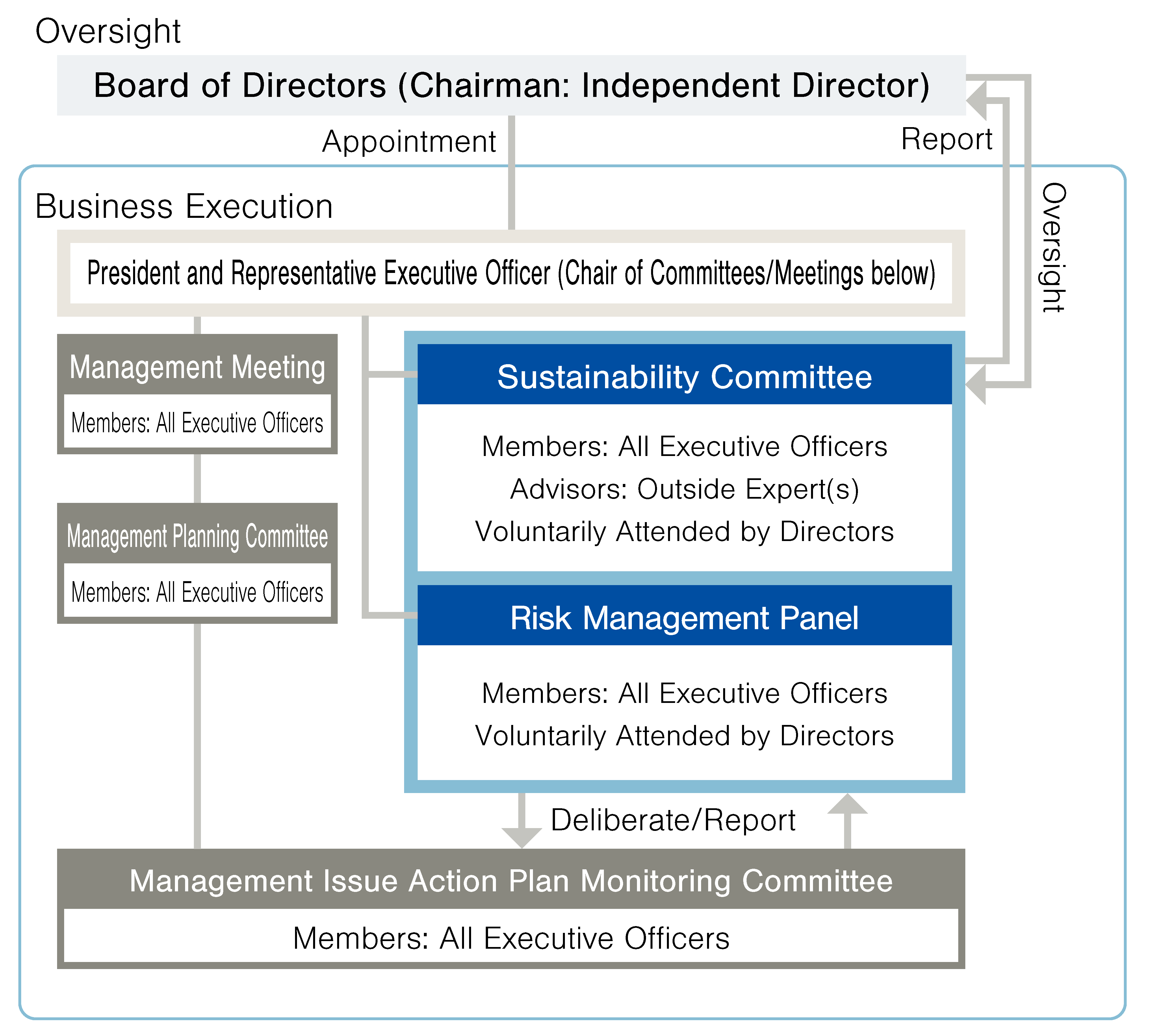
Strategy
We examine the impact climate change has on the businesses of the EBARA Group for each market using the process shown below. The climate-related strategies for the businesses for building and industrial system market, oil and gas market, water infrastructure market, solid waste treatment market, and semiconductor manufacturing market are developed under the responsibility of the presidents of the companies and reflected in the midterm management plan.
The process shown below is implemented under the responsibility of each company president for each market. The results of the analysis conducted by each company and measures to implement are summarized by the executive officer in charge of management strategies and disclosed after they are reported to the Sustainability Committee and confirmed by the Board of Directors.
The climate-related strategies are reviewed at the same interval as the development of the midterm management plan and reflected in the business strategies of each company.
(The results of the analysis conducted from the second half of 2021 to the end of March 2023)
Identification and Assessment of Climate-related Risks and Opportunities
The climate-related risks and opportunities in the businesses for building and industrial system market, oil and gas market, water infrastructure market, solid waste treatment market, and semiconductor manufacturing market were assessed as follows.
For the risk assessment, we first sorted risks into “physical” and “transition” types of risk. We then categorized similar risks into a medium category, after which we identified possible risk events that could happen in each business segment’s target market. We then assessed the possible magnitude of financial impact of those events from large to small.
In the opportunity assessment, we looked at each risk event identified in the risk assessment and evaluated if there may be aspects of opportunity. We then assessed the potential financial impact from acting on the opportunity from large to small.
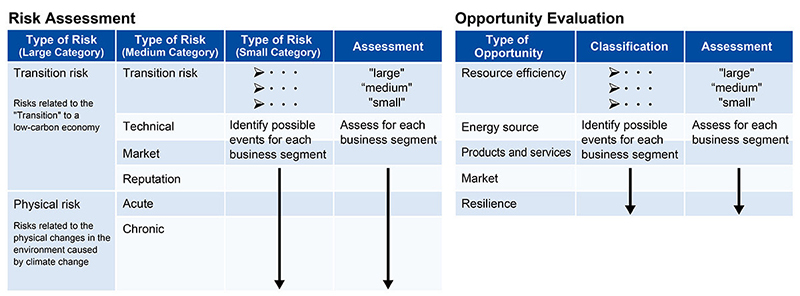
Identifying Risks and Opportunities
We identified the climate-related risks and opportunities to 2050 for each major market where the EBARA Group does business based on the transition risks, physical risks, and opportunities defined in the TCFD recommendations.
By referring to the reliable literature, such as the publications from the SASB and IEA and the Japanese Electrical and Electronics Industries Long-Term Strategy on Climate Change, we identified the risk items that might affect our businesses and comprehensively and qualitatively assessed the significance of the risks and opportunities based on their likelihood, scale, and financial impact. The factors that may affect our business activities as climate change progresses are assessed as chronic physical risks by region. For example, we assessed water risks by using the AQUEDUCT assessment of overall risk as an index. As we assessed water risks of our major business bases using AQUEDUCT and the results were low-medium, we determined that the significance as chronic physical risks was low.
For details on the AQUEDUCT assessment, please refer to its website on water risks.
Scenario Analysis
How will the business environment change in the 4°C and 1.5°C scenarios based on the collected parameters and scenarios? How will we, our customers, policies/regulations, and suppliers change in a changing business environment? In addition, we created a scenario on the likelihood of new entrants and alternatives appearing. There has been no change since the disclosure in 2023.
Impacts of Climate-related Risks and Opportunities on Financial Planning
Utilizing the financial and nonfinancial information of the EBARA Group, public information from the IEA and various countries, and databases of international institutions, we calculated the financial impact of climate-related transition and physical risks for each major market where the EBARA Group does business.
Strategies for Climate-related Risks and Opportunities
Based on the results of the financial impact assessment, we considered measures for climate-related risks and opportunities up to the year 2050.Based on the results of the financial impact assessment, we considered measures for climate-related risks and opportunities up to the year 2050.
Financial Impact Calculations for 4°C and 1.5-2°C Scenarios
Scenario analyses were conducted with the predicted fiscal 2025 operating profits of each business without taking any climate-related measures as “100”. We then calculated potential operating profits based on whether countermeasures were implemented or not under the circumstances of the risks and opportunities identified.
No action: Predicted financial impact of 4°C scenario and 2°C or less scenario based on making no changes to current products, services, and manufacturing processes
With countermeasures: Predicted financial impact of 4°C scenario and 2°C or less scenario with countermeasures implemented based on identified risks and opportunities
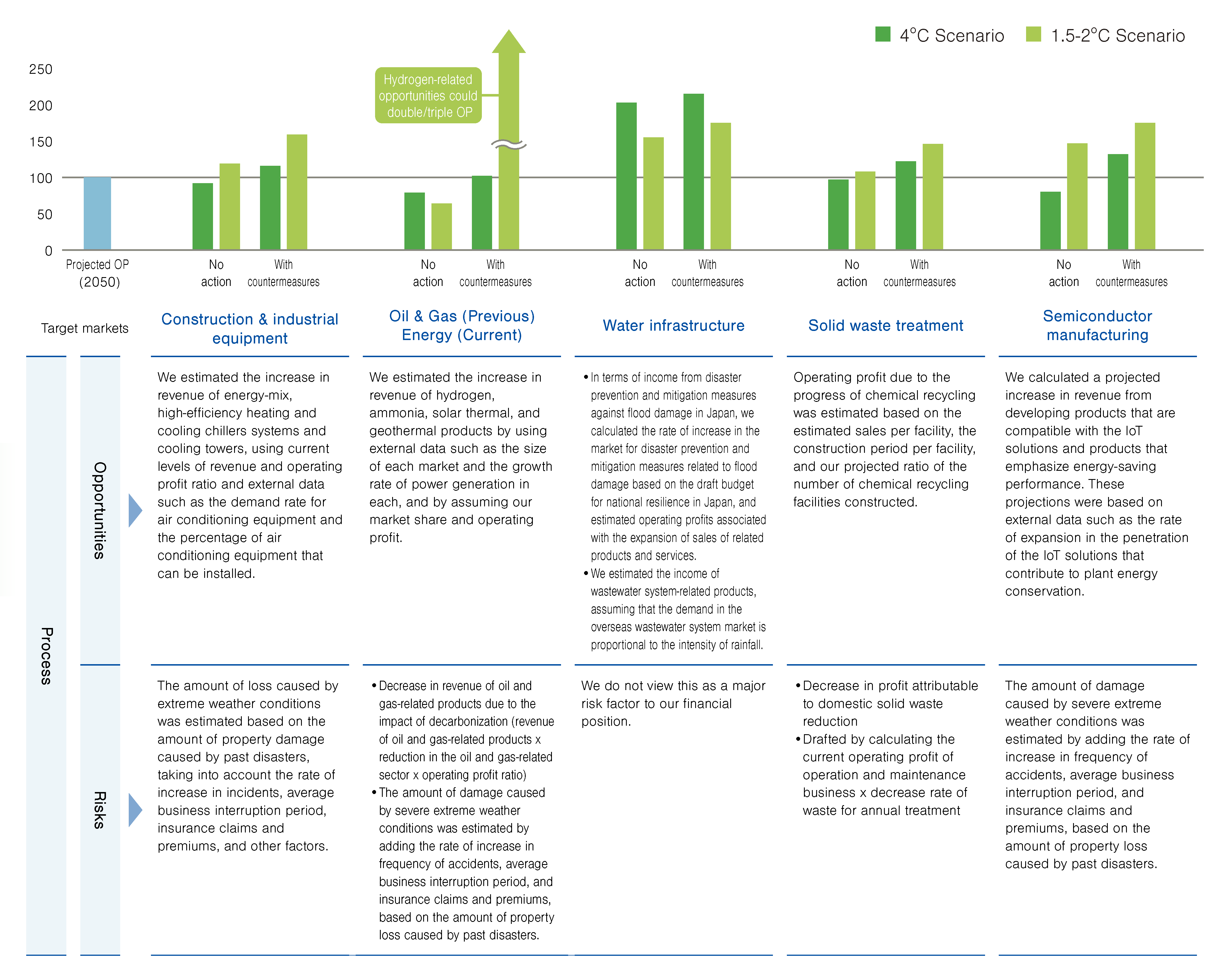
Risk Management
Integration of climate-related risks into overall risk management
Climate-related Risk and Opportunity Management
Important climate-related risks and opportunities identified for each target market are managed by the Non-Financial Management Issues Action Plan and the Management Issues Action Plan. These are concrete plans of action created by executives that span the course of the medium-term management plan E-Plan 2025.
We monitor social and environmental metrics in the Non-Financial Management Issues Action Plan and financial metrics in the Management Issue Action Plan is an action plan for managing economic indicators. The President, Representative Officer, CEO/COO chairs the monitoring meetings and reviews reports received from the in-house company presidents. In addition, the Sustainability Committee confirms the progress of the Group as a whole toward the metrics and targets related to Environmental (E), Social (S), and Governance (G) activities, and establishes action policies for increasing non-financial value.
Climate-related metrics are included in the Non-Financial Management Issue Action Plan. During the period of E-Plan 2025, we will monitor the financial impact of climate-related risks and opportunities, such as contributing to CO2 emission reduction through the provision of energy efficient products and setting goals to develop new products that further contribute to decarbonization.
The Management Issue Action Plan monitors the progress of financial indicators.
Metrics and Targets
We define “non-financial metrics” as metrics that affect social and environmental value, such as the Group’s CO2 emissions and contributions to reductions through products and services.
We have set non-financial metrics and targets in our medium-term management E-Plan 2025, which began in 2023, and are monitoring progress. We also monitor our progress in creating social and environmental value.
The Non-Financial Management Issues Action Plan for the period from 2023 to 2025 sets targets for each fiscal year until 2025 by backcasting from performance targets for 2030 and includes metrics and targets for climate-related risks and opportunities for each target market identified by climate-related scenario analysis. Furthermore, we are aiming to commercialize new businesses, through developing hydrogen-related products, inland aquaculture systems, and cultured meat production systems, to resolve various social issues, including climate-related risks and opportunities.
We have set a target to reduce GHG by 100 million tons in CO2 equivalent by 2030. Other outcome targets also relate to climate-related transition and physical risks. We are promoting measures to achieve our performance targets.
The course of action to achieve carbon neutrality and the progress of activities were debated at the meetings of the Sustainability Committee held four times in total in 2023. The Sustainability Committee also debated the setting of Scope 1 and Scope 2 targets by each company, Scope 3 targets, the setting of SBTs, and the introduction of ICP and discussed the course of action. The details of the discussions were reported to the Board of Directors.
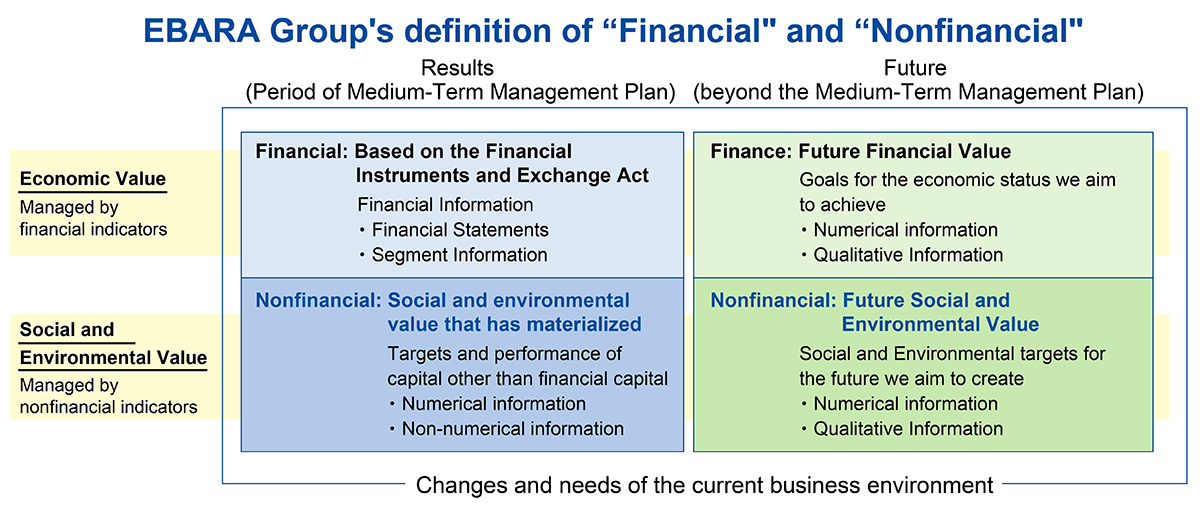
This target was set as one of the targets to be achieved by E-Vision 2030, the long-term vision the EBARA Group announced in 2020. As of 2020, we defined the amount of CO2 that our customers can reduce by using the products of the Group as avoided emissions and monitored it.
As the WBCSD released the Guidance on Avoided Emissions as a guidance on avoided CO2 emissions in March 2023, we decided to review our definition in accordance with the guidance.
We are continuing discussions to set the Scope 3 targets, the targets for avoided emissions, and our own targets in 2024.
Climate-related Metrics and Targets
We have determined 5 Material Issues facing the EBARA Group in our long-term vision E-Vision 2030. Three of these issues relate directly to risks and opportunities arising from climate change.
We have set KPIs and targets regarding climate-related risks and opportunities up until the year 2030 based on the climate-related scenario analyses we have conducted.
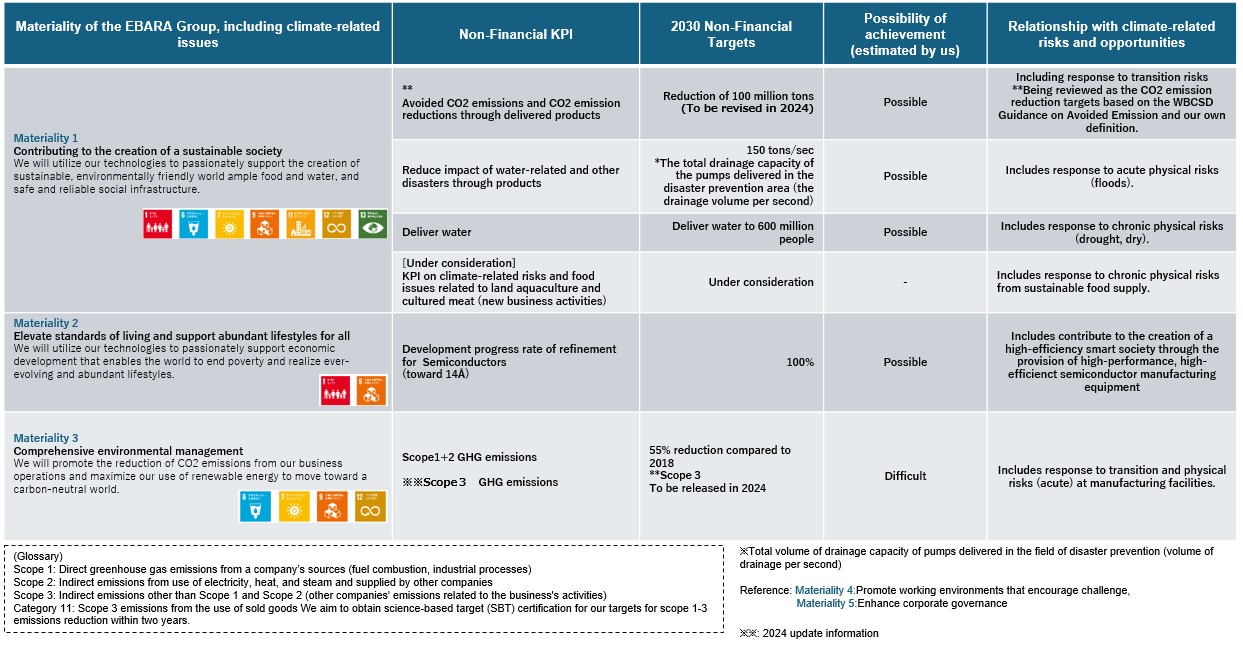
Sustainability Menu
EBARA's Sustainability
Sustainability Data
Governance
Environmental
Social
Social Contribution
Inquiry about sustainability